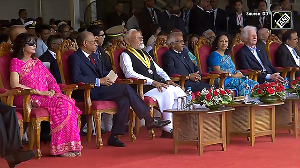'Kathmandu is under siege.'
'Maoist rebels have ringed the city; businesses with Indian investments have shut down; tens of thousands in the Nepalese capital are suffering; and the closest neighbour, India, is ready to bread-bomb parts of Nepal to avert a humanitarian crisis.'
Those are the recent headlines about Nepal.
Yet in the Kathmandu valley and its five cities, it is almost business as usual. Except for the daily labourers concerned about their hand-to-mouth existence, the public appears quite relaxed. Partly because the residents of Kathmandu, Bhaktapur and Patan -- and the new cities in the valley, Madhyapur and Kirtipur -- are now used to living with fear.
Violence and innumerable blockades and chukka-jams have almost become a daily routine here, thanks to the eight-year-old Maoist insurgency that has claimed the lives of over 10,000 people and displaced hundreds of thousands of people, eating into the country's crucial tourism and other industries.
The latest shock came last week when 12 big business houses with foreign investment shut shop in Nepal. This was followed by a blockade of the Kathmandu valley.
Nepal bombing has India Inc jittery
Both are handiwork of the Maoists, who want to overthrow the monarchy and replace it with a republic, or, as their leader Dr Babu Ram Bhattarai likes to put it 'a new democracy.'
As the blockade, which went into effect from Thursday August 18, nears its first week, it is beginning to have some effect: The prices of vegetables like tomatoes and fruits like apples are shooting up.
Yet the public is not panicking, and stockpiling hasn't started yet.
There is enough food in the valley of two million residents to last up to Dashain or Dasera, the biggest festival in the world's only Hindu kingdom, asserts the Nepal Food Corporation.
But poor people like Kanchhi Tamang are feeling the pinch.
"Just because of this blockade, we are suffering so much," says the 40-year-old woman of Khanikhola village in western Dhading district. One recent night, she walked for five hours carrying dokos (wooden baskets) on her back to catch an early morning bus to Kathmandu's vegetable market at Kalimati.
Thanks to the blockade and the resultant fear psychosis, the usually bustling Tribhuvan highway which passes through her village wears a deserted look except when mine-proof army vehicles pass through escorting convoys of buses and trucks.
The army has also picketed strategic hilltops around the highways and started patrolling the skies with helicopters.
"They are trying to terrorise the masses, but we have foiled their plans," says Brigadier General Rajendra Kumar Thapa, the Royal Nepalese Army spokesman. "The public is afraid. But we are making sure that the highways are open for buses and goods-carriers."
Ministers in the Deuba-led cabinet, government officials and the RNA top brass are taking pains to play down the gloom and doom portrait of the Kathmandu valley painted by the international media.
"There's no problem here, the ground reality is different," Minister for Information and Communication and the government spokesman Mohammad Mohsin said on Monday. "It's only that the international media is making a mountain out of the molehill, blowing up things beyond proportion."
But Nepal is in deep crisis.
Overnight on Saturday, August 21, a 2,000-strong Maoist force attacked Khalanga, the headquarters of Jumla in Nepal's most impoverished Karnali region in the mid-west.
An army soldier and five Maoists lost their lives in the surprise raid, which also saw the rebels abduct 11 government officials, including policemen and a civilian. "They fired long range weapons to attack government buildings," said an RNA officer in Nepalgunj, the mid-western
Maoists abduct 197 kids in Nepal
The battle between the government and Maoists came to head when then prime minister Sher Bahadur Deuba imposed a state of emergency in November 2001.
The emergency rule dragged the army, usually confined to ceremonial and UN peacekeeping duties, to the battlefield.
In early 2002, the rebels returned to the negotiating table, only to break the truce six months later and take the guerrilla warfare to what the Maoist leadership calls a 'decisive phase.'
But ministers in the Deuba cabinet insist that fears about the battle leading to a 'regime change' in Nepal are unfounded.
The four party coalition -- the Communist Party of Nepal (UML), pro-Terai Nepal Sadbhawana Party, breakaway Nepali Congress led by Deuba and pro-palace Rastriya Prajatantra Party -- is the result of a nearly two-year-old movement against King Gyanendra's 'regressive move' of sacking Deuba's government in October 2002.
King Gyanendra has charged the coalition -- which, however, lacks the much-needed backing of the bigger Nepali Congress led by former prime minister G P Koirala -- with the responsibility of resuming peace negotiations and organising fresh parliamentary polls next year.
That sounds like wishful thinking, given that the rebels are now coming closer to the capital city, say many analysts.
"The government should declare a ceasefire immediately," says Madhav Kumar Nepal, general secretary, CPN-UML, Deuba's main coalition partner. "Then only we can talk or think about elections."
For his part, Deuba, who has formed at least four high level committees including the Peace Secretariat to push peace, does not want another ceasefire unless it guarantees a full stop to the bloody conflict. So far, the government insists that 'the rebels are not sincere.'
With the rebels tightening the noose around the valley, India, concerned about the insurgency spilling over into its territory, has voiced concerns. Reports in the Indian media said an emergency meeting of India's National Security Council had expressed grave concerns about the nation 'under siege next door.'
The meeting, chaired by National Security Advisor J N Dixit, went on to approve bread-bombing of Nepal, said a report in Business Standard. The Indian embassy in Kathmandu, however, dismissed the report as 'unsubstantiated.'
But the fact remains that fuelled by widespread poverty and social inequality, the 'People's War' waged by the underground Communist Party of Nepal (Maoist) seems to be gaining momentum.
Almost everyone agrees that there cannot be a military solution to this problem.
"Never," said Dr Mathura Shrestha, former minister and president, Civil Society of Peace and Solidarity, as he led a peace procession of about 20,000 people in Kathmandu on Sunday. "There is no shortcut. Both sides have to immediately agree on a ceasefire and begin to talk, talk and talk. A solution can be worked out tomorrow."
But right now, Kathmandu seems more concerned about the negative headlines scaring off visitors just before another tourist season begins.
The author is a special correspondent with The Kathmandu Post






 © 2025
© 2025